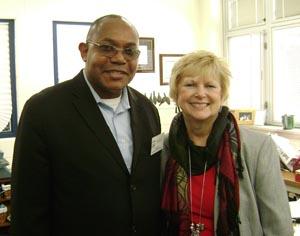
By Anne Marie Amacher
Trying to maintain traditions and adapt to new educational requirements keeps Catholic and public schools busy year round. Father Juvenalis Ndaula is seeing that during a year-long internship as part of his studies to earn a master’s degree at St. Ambrose University in Davenport.
The Tanzanian priest from the Diocese of Rulenge-Ngara in Africa came to the Davenport Diocese to study at St. Ambrose in 2006. He completed his bachelor’s degree and expects to graduate with a master’s degree in May.
His internship experiences at Assumption High School in Davenport and various public schools in Rock Island, Ill., have provided him with ideas to take back to Africa. “I have been made familiar with different activities and how to work better with faculty and teachers. I am here to gain more experience for when I go back.”
Fr. Ndaula spent the first semester of the current school year at Assumption High School observing, meeting with faculty and gaining practicum experience. Chuck Elbert, Assumption principal, said Fr. Ndaula visited classrooms and “became a visible, recognizable and approachable adult in the building. He belonged here.”
The priest spent a good deal of time working with Elbert and others on implementing Iowa Core Curriculum for students in grades kindergarten through 12 in Iowa’s public and accredited nonpublic schools. Core curriculum identifies essential skills and concepts all students need to know and apply to be successful. They must know literacy, math, science, social studies and 21st century skills such as health literacy, financial literacy, technology literacy and employability skills. As federal, state and diocesan curricula are integrated in the process, it takes a lot of planning, Elbert noted.
Fr. Ndaula said he shared his ideas on melding various curricula based on his experience as a Catholic school teacher and superintendent in Africa. “Education is constantly changing.”
Elbert said it was “refreshing to work alongside someone who has a natural curiosity and happiness about his life as a school administrator and as a priest. It is something that the staff and students picked up on. He is a great role model for religious vocations and for lifelong learning.”
For the second half of his internship, Fr. Ndaula wanted to work in a school rich in diversity and culture; he was placed in the Rock Island public school system in Illinois where he was assigned to four different public schools as well as administrative offices. The first school Fr. Ndaula worked in was Rock Island Center for Math and Science, a new school. He visited classrooms, observed, and helped supervise students at lunch and during the before- and after-school programs.
“He shared information about his home in Africa with the students. The children learned about Tanzania and the schools there. They enjoyed meeting him,” said Principal Ruth Ann Tobey-Brown.
She said one thing that struck the students was an observation Fr. Ndaula made while they were practicing volleyball. The priest told them that there were only two balls for his whole building back in Africa. This Rock Island gym class had at least 12 balls.
Something that stuck Tobey-Brown was the contrast in availability of technology. The Rock Island school has computers in the classrooms and elsewhere in the building. In Tanzania, Fr. Ndaula had the lone computer for the entire school in his principal’s office.
“It was a nice opportunity for Fr. Juve to be here and equally for us as well,” Tobey-Brown said.
Following his three weeks at the center, Fr. Ndaula moved on to Rock Island Academy. “It is very diverse in language and culture,” he said. The academy has many youth who are refugees to the area. “I worked with the staff on accommodating ALL students.”
Fr. Ndaula said he served as a go-between while at the academy. Although he doesn’t know the language or dialects of the various African nations, the students from those countries felt at home with him. He also knew the education system of parts of Africa, which was an advantage.
“I learned a lot,” he said. “And these children have an advantage here in the United States.”
After completing his time at the academy, Fr. Ndaula worked at Edison and Washington junior high schools and then in the district offices.
Following graduation in May, Fr. Ndaula hopes to pursue his Ph.D., “but that depends on what my bishop back home says. If he says I need to come back home, I will go back home and work.”
Fr. Ndaula said he hopes to be a superintendent in his diocese again. “They sent me here to gain more experience in administration and that is what I have done.”








